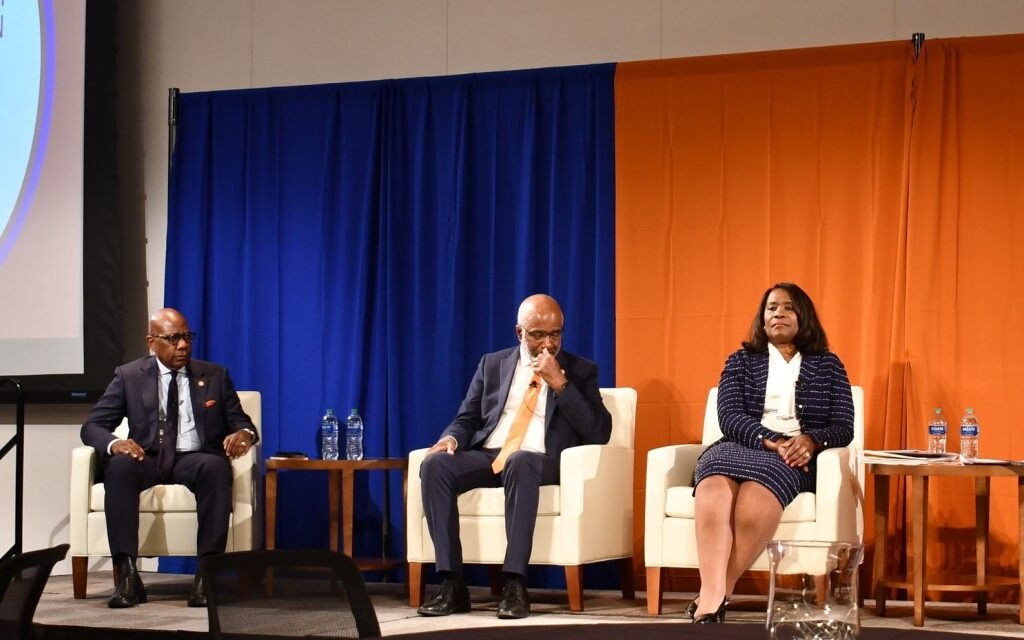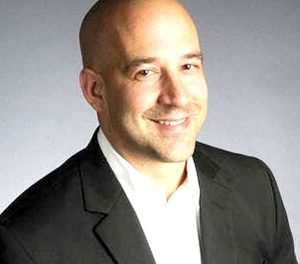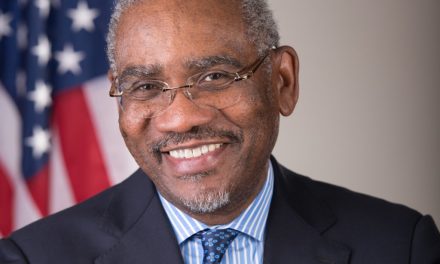By Ashleigh Fields,
AFRO Assistant Editor,
afields@afro.com
The D.C. metropolitan Area Alumni Chapter of the Morgan State University Alumni Association gathered on Nov.13 to acknowledge 75 years of existence. The group used the occasion to celebrate, network and hold important discussions about the impact and future of historically Black colleges and universities (HBCUs).
“I would not be the man I am if it were not for Morgan State,” said Richard Allen Moore, president of the D.C. Metropolitan Area Alumni chapter and former assistant state’s attorney for Prince George’s County. “My deceased wife and I have been members of the alumni association for over 35 years. There’s no doubt in my mind that the D.C. Metropolitan Chapter exemplifies all that is required to effectively promote the interests of our beloved Morgan State University.”
Moore shared these opening remarks for the commemorative event entitled, “Reimagining HBCUs Beyond 2024” which took place at Boeing’s headquarters in Arlington, Va.
The company welcomed leaders from the nation’s top historically Black universities to include Larry Robinson, Ph.D., of Florida Agricultural and Mechanical University (FAMU), Glenda Glover, Ph.D., of Tennessee State University and David K. Wilson, Ed.D., from Morgan State University.
The three served on a panel that aimed to address issues previously encountered by HBCUs and discuss the support needed to uplift such institutions in the future. Recruitment, restitution and opportunities for research proved to be topics of importance and cited as areas with room for improvement.
“Our alumni must understand the power they have in getting out there and bringing that institution to the space where prospective students are gathering so they can really put in front of them why ‘X HBCU’ is critical to their future to help us stretch the legacies and names of these institutions across the nation and across the world,” said Wilson, using a hypothetical HBCU name as an example. “Alumni must double down on being mentors and sponsors for current students. Alumni must give. They must give to the level that they can.”
Wilson mentioned that these can be social, financial or even professional contributions but every act of engagement counts specifically when universities utilize these metrics to support federal funding from Congress, private investors and other entities.
“When I arrived at Morgan, the alumni investment rate was 6.4 percent. And believe it or not, this is a question funders are interested in,” said Wilson. “They ask if alumni aren’t donating to your institution then why should we?”
Glover chimed in by noting that these numbers are also imperative as it pertains to state funding.
“We are not state supported, we are state assisted. TSU and FAMU are land grant institutions,” said Glover, speaking of Tennessee State and FAMU respectively. Glover serves as vice chair for President Joe Biden’s HBCU Board of Advisors.”
Land grant institutions were established under the Second Morrill Act of 1890. Their programs main objectives are intended to “strengthen research, extension and teaching in the food and agricultural sciences.” However, this year the U.S. Department of Education reported that 16 states have underfunded these HBCUs by a combined $12 billion. The state of Tennessee underfunded its HBCU land grant college more than any other state forcing Tennessee State to engage in an effort to reclaim a staggering $2.1 billion.
This discrepancy poses a threat to education for Black students and a lack of opportunities across the board for stakeholders at these institutions. It affects each of these schools as it pertains to national rankings and academic ingenuity.
A limiting factor that the three presidents attribute to their stagnant designation as an R2 University, a term given to doctoral universities with high research activity. This categorization is just one step lower than an R1 University which is given to doctoral universities with very high research activity. Currently, no HBCU in the country can claim this status which differs by about $40 million in funding.
This qualification is one that HBCU prospective students may not consider or understand but it affects their experiences daily.
“In education we want to go to R1– that’s the cream of the crop. However, our students aren’t necessarily coming to TSU because we are an R2 university or an R1. We aren’t there yet,” said Glover.
Nonetheless, it gives Black researchers a chance to present life-changing data and information on topics disproportionately impacting communities of color.
“We added a specific level of productivity in our grad programs and we added new grad programs,” said Robinson in reference to efforts to gain R1 status at FAMU. “I just dont see some of the complex problems being solved in the communities we serve without us being involved.”
Last year, Morgan State spearheaded an $11 million project to achieve R1 status through the implementation of top tier programs at state funded interdisciplinary research centers including Cybersecurity Assurance and Policy Center, Center for Urban Health Equity , Center for Equitable Artificial Intelligence and Machine Learning Systems , Center for Data Analytics and Sports Gaming Research and the Center for Urban Violence and Crime Reduction.
“Baltimore city is not going to be what it can be, if Morgan is not driving that train. We are in our city, we smell our poverty, we live in it,” said Wilson. “Our programs are speaking to the challenges we see everyday.”
This unique level of exposure was underscored by Hampton University graduate and keynote speaker Dr. Dietra Trent who serves as executive director of the White House HBCU initiative.
She left the audience motivated by commenting on how imperative it is to, “continue beating the drum, continue to make people hear and see us.”
The post Morgan State Alumni gather to reimagine HBCUs beyond 2024 appeared first on AFRO American Newspapers .











